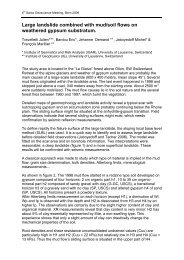Open Session - SWISS GEOSCIENCE MEETINGs
Open Session - SWISS GEOSCIENCE MEETINGs
Open Session - SWISS GEOSCIENCE MEETINGs
You also want an ePaper? Increase the reach of your titles
YUMPU automatically turns print PDFs into web optimized ePapers that Google loves.
286<br />
Symposium 11: Social Aspects of Water + Environmental Challenges of Border Regions<br />
11.2<br />
Domestic water as means of masculine domination. An analysis from the<br />
High Atlas Mountains<br />
Graefe Olivier<br />
Departement für Geowissenschaften, Université de Fribourg, CH-1700 Fribourg<br />
The domestication of water in the sense of taming and controlling the supply of drinking water on the one hand and making<br />
water available at the domicile on the other hand, represents progress to many rural Moroccan households. Especially women<br />
do benefit of the new facilities by saving them many efforts of fetching water outside the village. But this undeniable<br />
technical improvement for rural areas can also be analyzed in the light of the re-islamization of society and profound social<br />
change as a means for men to reify their domination in a context of threatened masculinity. This paper will show, following<br />
Bourdieu’s and Baudrillard’s early works, the political and symbolic logics and meanings which are lying underneath the<br />
modernization of rural water supply emphasizing the dialectical relationship between evolving waterscapes and dynamic<br />
gender relations.<br />
REFERENCES<br />
Baudrillard, J. 1968, Le système des objets. Paris.<br />
Bourdieu, P. 1972, Esquisse d'une théorie de la pratique. Paris.<br />
Bourdieu, P. 1998, La domination masculine. Paris.<br />
Jackson, C. 1998, Gender, irrigation, and environment: Arguing for agency, Agriculture and Human Values, 15, 313-324.<br />
O’Reilly, K. 2006: “Traditional” women, “modern” water: Linking gender and commodification in Rajasthan, India,<br />
Geoforum, 37, 6, 958-972.<br />
Shiva, V. 1989, Staying Alive: Women, Technology and Development. London.<br />
11.3<br />
Increasing sustainability of irrigated urban agriculture in southern<br />
countries by Participatory Education and Action Research (PEAR) among<br />
small producers: case study of Dakar, Senegal<br />
Chaudhuri Nita*, Gueye Anne**, Pfeifer Hans-Rudolf**, Niang Seydou*** & Cole Donald*<br />
*OISE Coll. Prog. Env.Health, University of Toronto, Canada<br />
** IMG - Centre d’Analyse Minérale, Geoscience and Environment, University of Lausanne, Switzerland<br />
*** Laboratoire de traitement des eaux usées, IFAN-Université Cheikh Anta Diop, Dakar, Senegal<br />
Urban agriculture in Senegal, as in most developing countries, relies on extremely vulnerable small production units. In the<br />
region of Dakar (Fig. 1), the lack of access to adequate water for drinking and irrigation, poor soil fertility and invasive pests,<br />
lead to the use of unauthorized fertilizers and pesticides (Fig. 2, Tab. 1): Using untreated waste water for irrigation and excessive<br />
pesticide spraying are widespread practices. A participatory education and action research (PEAR) - type process within<br />
an ecosystem health framework has been used to investigate different positions of stakeholders and especially the<br />
producer issues. Several individual inquiries upon 50 producers revealed the different agricultural practices and the producer<br />
perceptions of environment and health before (March 2005) and after educational sessions (March 2006). Results show<br />
(Tab. 1 and 2): 1) extremely various agricultural practices (irrigation with waste water or saline ground water, fertilizer and<br />
pesticide use) depending mostly on short term decisions, based on financial and market availabilities; 2) low perception of<br />
long term soil fertility management and of health impacts associated with pesticide and waste water exposure 3) after interactive<br />
workshops and training, significant increase of health risk perception has been observed, marked e.g. by the use of<br />
protective equipment when treating with pesticides. The PEAR approach has been shown to be effective. However, several<br />
barriers still exist, such as security of land tenure, access to credit, fear related to decrease in productivity, lack of training<br />
and information in the use of alternatives to chemical agriculture. Regular workshops will certainly help to reach sustainability.









